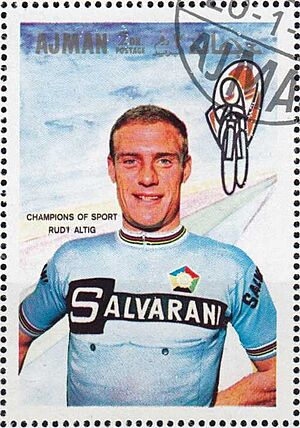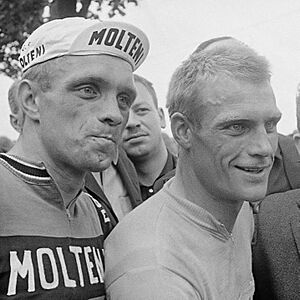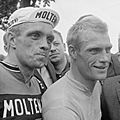Rudi Altig facts for kids

Altig in 2006
|
|||
| Personal information | |||
|---|---|---|---|
| Full name | Rudi Altig | ||
| Born | 18 March 1937 Mannheim, Germany |
||
| Died | 11 June 2016 (aged 79) Remagen, Germany |
||
| Team information | |||
| Current team | Retired | ||
| Discipline | Track and road | ||
| Role | Rider | ||
| Rider type | Sprinter | ||
| Major wins | |||
|
|||
Rudi Altig (born March 18, 1937 – died June 11, 2016) was a famous German professional cyclist. He raced on both track and road bikes. Rudi won the 1962 Vuelta a España, a major Spanish race. He also became a world champion in 1966. After he stopped racing, he worked as a TV commentator.
Contents
Early Cycling Days
Rudi Altig was born in Mannheim, Germany. This area was known for producing great track cyclists. He started racing in 1952, following his older brother, Willi Altig. The brothers often raced together in two-man events like the madison. They became the best team in Germany.
A British race organizer, Jim Wallace, invited Rudi to race in England in 1956. He was amazed by Rudi's talent. Wallace said that Rudi and his partner were incredibly strong. They won almost every race they entered.
Rudi became Germany's national sprint champion in 1957 and 1958. Later, a coach named Karly Ziegler helped him become a "pursuiter." This meant he specialized in races where cyclists chase each other. In 1959, Rudi won the national pursuit championship. He also won the madison championship with his brother. That same year, he became a world champion in Amsterdam.
Professional Track Racing
Rudi Altig turned professional in 1960. This was just one year after he became a world champion. He quickly became a star in "six-day races." These are long races held indoors on a velodrome (a special track). Riders race in teams for six days, taking turns.
Jim Wallace said Rudi quickly became a top professional. He filled indoor tracks with fans. Rudi helped bring back a big boom in winter racing in Germany. He won 62 races on the track. He also won 22 six-day races, especially in Germany. He won four times in Cologne and Dortmund.
Rudi explained that he raced on the track to earn money. He said that cyclists today are paid better. They don't need to race as much on both road and track. But he didn't regret his era. Rudi was tall (1.80 meters) and weighed 80 kg. He was known for being very tough on his bikes and his opponents.
Road Racing Success
Rudi started his professional career on the track. But Raphaël Géminiani, another cyclist, convinced him that he could be even more famous on the road. Rudi agreed because road fame would lead to better track contracts.
In 1962, he won the Vuelta a España, a major three-week race in Spain. He also won three stages in that race. In his first Tour de France that same year, he wore the yellow jersey (for the overall leader) for five days. He won three stages and the points competition.
In 1964, Rudi won his first "Classic" race, the Tour of Flanders. This is a very tough one-day race. He rode alone for 60 km and won by four minutes! That same year, he also won the German National Road Race Championships.
In 1965, he came second in the professional road world championship in Spain. He lost to Tom Simpson from England. Simpson later said that he and Altig made an agreement during the race. They decided to race side-by-side in the final kilometer. Simpson respected Altig as a great rider.
But Rudi didn't have to wait long for a world title. He won the 1966 world championship near his home, at the Nürburgring.

In 1966, Rudi won three stages in the Tour de France. He also won two stages in the Giro d'Italia, another big race in Italy.
His second and final Classic win was the Milan–San Remo in 1968. He also won two stages of the Vuelta a España that year. In 1969, he won the first stage (a short time trial) of the Tour de France. This meant he wore the yellow jersey again.
Riding with Jacques Anquetil
Rudi rode his first Tour de France as a "domestique" (a helper) for Jacques Anquetil. Anquetil was a famous French cyclist. Rudi was also the team's sprinter. They had a difficult relationship, especially when Rudi took the yellow jersey early in the Tour de France. Anquetil worried that Rudi's lead would make the team work too hard. They only became friends later when they raced for different teams.
In 1962, they were paired for the Trofeo Baracchi, a two-man time-trial race in Italy. A writer named René de Latour described an amazing moment. Rudi was at the front, pulling Anquetil. Anquetil started to fall behind. Rudi had to slow down, wait for Anquetil, push him from behind, and then sprint back to the front. He did this many times! They still won the race by nine seconds. Rudi later said, "Jacques wasn't happy, it didn't please him at all, but I wanted us to win. So I got him by the saddle, I got him by the shorts, and hop!."
Life After Racing
After he stopped racing, Rudi Altig became a "directeur sportif" (team manager) for a cycling team. He also worked for five years as a national coach. He became a well-known television commentator.
He was known for speaking his mind. For example, he once said that American rider Lance Armstrong was a "tyrant" who used his teammates. About fellow German rider Jan Ullrich, he said he should talk less and do more.
Rudi Altig passed away on June 11, 2016, in Remagen, Germany, due to cancer.
Images for kids
-
Altig on a 1969 UAE stamp
See also
 In Spanish: Rudi Altig para niños
In Spanish: Rudi Altig para niños
 | Janet Taylor Pickett |
 | Synthia Saint James |
 | Howardena Pindell |
 | Faith Ringgold |





